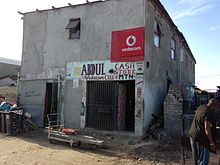
Spaza shops, also known as tuck shops, originated in Apartheid-era South Africa when enterprising historically disadvantaged individuals were restricted from owning formal businesses, they began setting up informal, micro-convenience shops from their homes to serve their communities' daily needs in the townships. Spaza is a generic Northern Sotho colloquial term, meaning hidden or camouflaged.
Unregulated Transformation
Since 1994, these shops have continued to transform and develop in popularity and necessity along with the sprawling townships where people live long distances from the more expensive, formal shopping areas. Initially selling daily essentials like mielie meal, bread, and sugar over time, they've expanded their offerings to include a variety of goods, from small furniture items to toiletries, and even some electronics.
South African banks are trying to win spaza shops as "bank shops" offering minimal banking services at lower costs than full bank branch offices. The link to the bank's back office is mostly via mobile phone based mobile banking.
Continental Migration
Further information: Immigration to South AfricaWith the fall of apartheid came an inflow of migrants from across the continent, seeing many undocumented Ethiopian and Somali asylum-seekers coming to South Africa and opening spaza shops, creating tension between local and foreign micro-entrepreneurs. South Africa received 778,000 asylum applications between 2008 and 2012 alone and now more than 60% of spaza shops in townships today are run by foreign nationals. This tense situation between shopkeepers and local residents is helping to drive a culture of xenophobia and social conflict.
Food poisoning epidemic
In September 2024, there were 890 reported incidents of food-borne illnesses and spaza shops were identified by President Cyril Ramaphosa as being responsible. Pesticides and organophosphates such as Terbufos and Aldicarb were found to contribute to some of deaths.
On 15 November 2024, all spaza shops were told they had 21 days to register with their local municipality. Those shops which were implicated in 22 children's deaths would also to be shut. The South African Informal Traders Alliance (SAITA) agreed that the issue of food safety was vital;, however, the root causes were that the City of Johannesburg had cut budgets and neglected health inspections. Government regulations pertaining to the Foodstuffs, Cosmetics and Disinfectants act (1972) had not been followed or enforced. Health inspections had not been a priority for all levels of government. Spaza shop owners were instructed to register for a trading permit. Deadline dates for registration was supposed to be 13 December. Confusion about registration deadline has emerged and the government has apologized for the misunderstanding. Final registration dates was announced as 17 December 2024. By this date 43,000 applications had been received and approximately 19,300 approved. On the 18th of December, the deadline for Spaza shop registration was extended to the 28th of February 2025.
References
- ^ Lamb et al (2019) Lessons from Foreign Owned Spaza Shops in South African Townships. Journal of Reviews on Global Economics. 8, 1351-1362. Retrieved 12 August 2024.
- ^ Kgaphola, Tawodzera, & Tengeh (2020) An Assessment of the Structure and Operation of Spaza Shops in a selected township in South Africa
- Bear, M, P Bradnum, S Tladi and D Pedro (2005) Making Retail Markets Work for the Poor – why and how triple trust organisation decided to intervene in the Spazamarket in South Africa. Washington, D.C.: The SEEP Network.
- Terblanché, N.S. (1991). "The spaza shop: South Africa’s first own black retailing institution", International Journal of Retail & Distribution Management, Vol. 19 Iss 5 pp.
- ^ Charman et al (2012). From local survivalism to foreign entrepreneurship: the transformation of the spaza sector in Delft, Cape Town. Transformation: Critical Perspectives on Southern Africa. 78. 47-73. Retrieved 12 August 2024.
- "Standard sees big target at the lower end". MobileMoneyAfrica. 23 April 2011. Retrieved 2 May 2012.
- Anyadike(2023) From Ethiopia to South Africa: The human cost of a neglected migration route. The New humanitarian
- ^ "African migration: To the land of good hope: African migrants head south as well as north". The Economist. 2016. Retrieved 13 August 2024.
- Mutsila, Lerato (15 November 2024). "Ramaphosa orders immediate closure of all spaza shops linked to child deaths as food poisoning cases grow Ramaphosa spaza shops closed linked to child deaths food poisoning". Daily Maverick. Retrieved 16 November 2024.
- "Address by President Cyril Ramaphosa on deaths of children due to food-borne illnesses".
- "Spaza shops implicated in child deaths to be shut down | SAnews". www.sanews.gov.za. 15 November 2024. Retrieved 16 November 2024.
- Eyaaz (15 November 2024). "Spaza shops implicated in the deaths of children to be closed immediately – Ramaphosa". The Mail & Guardian. Retrieved 16 November 2024.
- "Government races to address Gauteng's spaza shop crisis, but concerns remain". 13 November 2024.
- "ActionSA Welcomes with Extreme Caution the Promise to Deploy Food Inspectors to Monitor Spaza Shops in Townships". 2 November 2024.
- "Shortage of health inspectors poses a serious risk to Johannesburg learners".
- Petersen, Carlo. "SA govt ignored warning about food contamination related to pesticides: Food safety expert". EWN. Retrieved 24 November 2024.
- Roberts, Lillian (22 November 2024). "Food poisoning webinar safety pesticides". Daily Maverick. Retrieved 24 November 2024.
- "Guide to register spaza shops | SAnews". www.sanews.gov.za. 20 November 2024. Retrieved 30 November 2024.
- https://www.citizen.co.za/news/minister-clarifies-spaza-shop-registration-deadline/
- https://mg.co.za/business/2024-12-18-government-pushes-deadline-for-spaza-shop-registration-to-28-february/